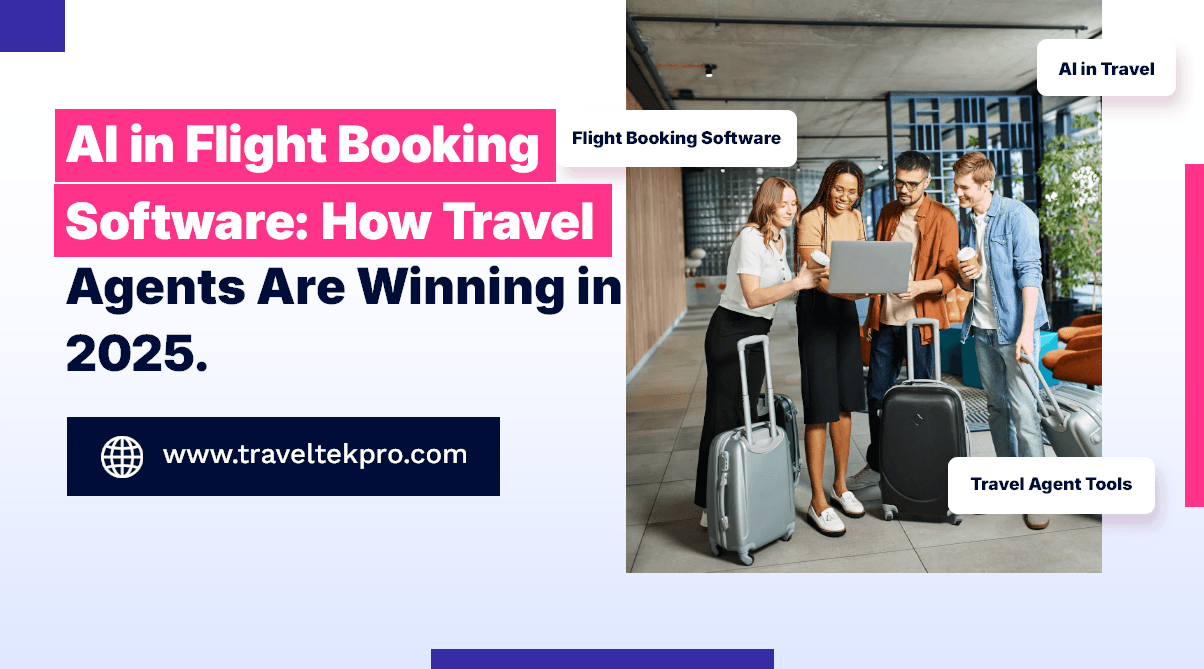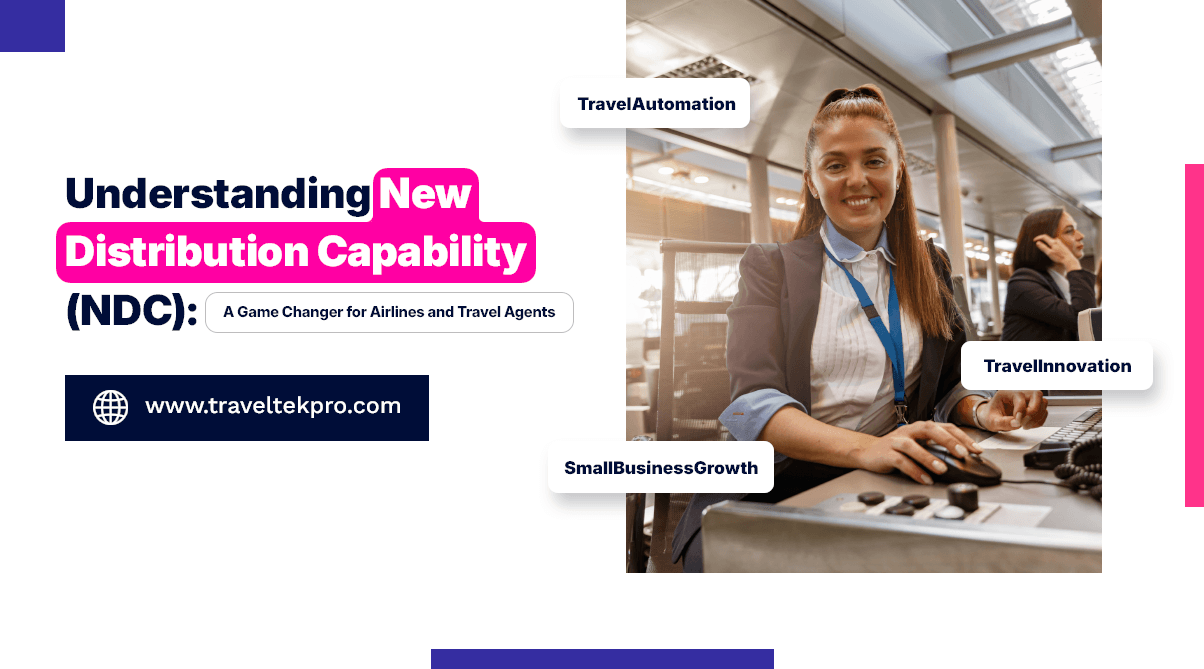AI in Flight Booking Software – How Travel Agents Are Winning in 2025
In 2025 the travel industry will undergo a major transformation with artificial intelligence playing a very important role. For travel agents like you, AI AI-powered flight booking software has become a very important tool, streamlining operations and also improving your customer experience. In this guide, you can learn everything about how AI is changing the airline reservation system and travel agents like you are embracing the technology to stay competitive.
The rise of AI in travel tech
AI has completely permeated different sectors, and the travel industry is no exception. From personalized recommendations to travel updates, AI is improving every part of travel planning. As a travel agent, you can truly use AI to offer more efficient tailored return services to your clients with your flight booking software.
What is AI-powered flight booking software?
AI-powered flight booking software for travel agents uses machine learning algorithms to analyse a huge amount of information. It allows you to search and compare flight options quickly. You can easily predict, customize recommendations and automate your booking process. This also makes it very easy for you to improve your customer service through chatbots. These tools save a lot of time and also improve accuracy and customer satisfaction like no other.
Top 6 benefits of AI in flight booking software
1. faster searches, better results
In the past, searching for the best flights meant manually combing through dozens of booking platforms, filtering through hundreds of results to find the perfect flight. This process could take a lot of time. With AI AI-powered airline reservation systems, you can get results in seconds. AI can instantly compare thousands of light options, factoring in multiple variables like price, duration and seat availability. AI-powered software can help you narrow down the options and present the best choices.
2. Predictive pricing for Smarter decisions
One of the biggest challenges in booking flights is the fluctuation in prices. Airfare can change instantly because of demand competition and different external factors. But with AI-powered flight booking software for travel agents, you can easily predict when prices will go up or down. Using data from the past, my systems can forecast the best time to buy tickets, allowing you to secure the best fare for your client. The predictive pricing tool can save a lot of money for travellers and also build trust, as you can offer great advice with a level of certainty.
3. Customised travel options
AI is at the forefront of customisation, one of the most sought-after features in the travel industry. Whether it’s a traveller’s preferred seat class, flight time, or just favourite AI-powered systems can consider each individual’s unique preference and requirements. With time, the tools learn from different previous bookings and behaviours to make more customised suggestions for your clients. The customisation ensures that your clients receive flights that are perfectly aligned with their specific Preferences, making the travel experience enjoyable and smoother.
4. Round-the-clock support.
AI systems don’t sleep, which means they offer you 24/7 assistance. As a travel agent, you can just set up an AI-powered chatbot or even virtual assistants to help you handle simple customer queries like flight status updates, booking confirmation and cancellation requests. The systems work in real time, providing you with immediate support for your clients no matter the time of day. This reduces your workload. You can just focus on more complex tasks and also improve customer satisfaction by offering instant help.
5. Reduced errors and missed bookings
Human error is a constant risk in the manual booking process. One wrong click and lead to a booking website like a misspelt name or incorrect flight date. But now you don’t have to worry about any such mistake as AI-powered flight booking software double-checks the inputs and also flags inconsistencies before they become problems. The AI system can also handle routine rebooking, cancellations or changes using a lower chance of any human error. This leads to a smooth booking process for both you and your customers, ensuring that your flight itinerary is accurate and error-free.
6. Boosted productivity and profitability
By automating repetitive tasks and streamlining the booking process, AI allows you to focus on high-value activities like building relationships with your clients and creating custom travel itineraries. When you use an with AI, you can spend less time on manual tasks and handle more clients, handle more bookings, and ultimately grow your business. Additionally, by using AI data-driven insights, you can also offer customized services which will help you increase your customer loyalty and can repeat business.
Manual booking versus AI-powered systems
| Feature | Manual Booking | AI-Powered Booking |
| Time Required | Hours | Seconds |
| Accuracy | Prone to human error | Highly accurate and consistent |
| Personalization | Limited | Highly personalised based on data |
| Price Tracking | Manual, time-consuming | Automated, predictive |
| Customer Support | Limited hours | 24/7 support with AI chatbots |
| Error Reduction | High risk of errors | Low risk of errors |
As you can see in the table above AI AI-powered systems truly outshine manual booking methods in nearly all the categories, saving you a lot of time, improving accuracy and also offering better prices.
Different types of travel agents are benefiting the most from AI booking tools.
Corporate travel agents
As a corporate travel agent, you might handle complex bookings for business professionals, often requiring last-minute changes and the management of loyalty programs. With AI tools, you can just streamline the process by providing real-time updates, forecasting pricing trends and offering customized corporate travel options.
Luxury travel advisors
Luxury travel claims even expect a high level of customisation and attention to detail. AI can help you predict exactly what your client needs, offering customized services like private jets, 5 5-star hotels and exclusive experiences.
Online travel agencies
Online travel agencies really thrive on speed, variety, and low prices. AI allows you to streamline flight searches, track price trends, and also offer customized travel suggestions to a huge range of customers, improving competitiveness in the crowded online marketplace.
Independent travel consultants
As an independent travel consultant, you can benefit immensely from AI by automating your routine parts of flight booking. With fewer resources as compared to larger agencies, you can use AI tools to maintain a level of service and offer customized experiences without being bogged down by repetitive tasks.
Challenges and myths around AI in flight booking
Despite the plenty of benefits of AI-powered flight booking systems, there are a lot of challenges and myths. AI will replace travel agents as one of the biggest myths. AI tools are here to automate routine tasks, saving a lot of time and reducing errors, but they cannot replace the personal touch.
AI is to expend another myth that you need to know about. Today, it is available through subscription models and scalable options that suit businesses of all sizes. The return on investment is also amazing.
How to choose the best AI-enabled flight booking software?
- You will need to ensure that the software provider offers strong customer support, preferably 24/7.
- Your chosen system must easily integrate with your CRM and invoicing systems.
- Make sure that the platform aligns with the global data protection regulations like GDPR. Travel information is sensitive, and any breaches can be damaging to your business.
- Always look for software with clear pricing models and avoid tools that come with hidden fees.
- Several AI-powered booking platforms also offer free trials or live demos. You can use these to test if the tool aligns with your agency’s workflow.
So, above all, you need to know that the future of flight booking is already here and it’s AI-powered. In 2025, travel agents are winning but not abandoning technology, but by embracing it. A powerful airline reservation system has fundamentally changed how you work, shifting the focus from manual searches and repetitive tasks to providing smarter, more customised and faster service.
Read More: What is an Airline Reservation System and How Does It Work?
FAQ’S
1. Can I completely replace travel agents in flight booking?
AI has revolutionized the flight booking process, but it does not entirely replace the unique value that human travel agents provide. While AI-powered systems can automate repetitive tasks, deliver instant recommendations, and manage bookings with remarkable speed and accuracy, the human touch remains essential for complex itineraries, special requests, and personalized service
2. Are AI powered flight bookings good and expensive?
AI-powered flight booking solutions are not inherently expensive. In fact, the adoption of AI has democratized access to advanced booking tools, making them scalable and cost-effective for agencies of all sizes-from small boutiques to large enterprises
3. What is the biggest benefit of AI in flight booking?
The most significant advantage of AI in flight booking is its unparalleled speed and accuracy. AI can instantly analyze vast amounts of data-from flight schedules and fare trends to traveler preferences and loyalty programs-delivering the most relevant options in seconds
4. How is AI transforming flight booking for travel agents in 2025?
AI-powered flight booking software is enabling travel agents to automate bookings, boost efficiency, and deliver hyper-personalized services. This allows agents to process more requests, reduce manual errors, and stay competitive in a rapidly evolving market.
5. How secure is AI-powered flight booking?
Modern AI booking systems incorporate advanced security protocols, including biometric authentication and real-time fraud detection, ensuring that customer data and transactions remain secure.
6. What’s the future of AI in flight booking beyond 2025?
AI is expected to become even more sophisticated, with enhanced voice and emotion recognition, deeper personalization, and seamless integration across devices and platforms, making travel planning increasingly frictionless and customer-centric.
Let's Start Your Project
Let us help you achieve your goals, by creating the best solution for you!




